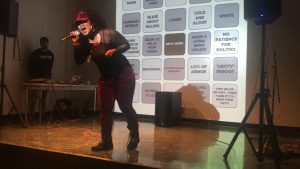Just a year ago, Janine Guerrier thought she knew her plans for her future: law school and a life in politics; she never saw a career in music as a possibility. But after winning the WHCS Radio Rap Competition last May, her vision for her future started to shift.
With urging from her friends and her own ambition, Guerrier, who graduated last year with a degree in community health education with a focus study in sociology, got right to work. By November 2018 she had released her debut album, Femtivity, on platforms such as Spotify, Apple Music and Tidal under the name Kiki Devii. And last Thursday, she held her first concert on campus – and packed a room in Thomas Hunter with people waiting for her debut performance.
The name Kiki was given to Guerrier by a member of the Haitian Student Association shortly after she won the competition. And then, one morning Guerrier woke up in her Bronx apartment, pointed at herself in the mirror, and said “You’re Kiki Devii.”
She is still learning herself who Kiki Devii really is.
“When I’m performing, I take a step back and whoever takes over in that moment is Kiki Devii. I kinda blackout and people have to tell me what just happened,” said Guerrier.

She does know one thing, that she is fully herself when Kiki Devii takes over. She describes this as the greatest gift from this entire experience thus far, and she plans to use it to speak up for any group that she feels needs to be heard.
Music helps her get her thoughts and her own feelings out there, but Guerrier has always been vocal on issues she sees in society, speaking her mind for over a year on her own radio show on WHCS called La Morena Enojada (The Story of the Angry Black Woman). Guerrier has educated herself on the struggles of many cohorts but she is most upset with the plight of Native Americans.
“I’ve done a lot of reading and research and I’m just appalled that we haven’t even given them an opportunity to speak,” said Guerrier.
Guerrier is originally from Queens but she currently lives in the Bronx, and says the move has allowed her to connect and embrace her Latino culture in a way she hasn’t before and she is grateful for that. Guerrier went to high school in Jamaica, which she said allowed her to have more than just the experience of an Afro-Latina in America but also in another country.
Music was always a part of Guerrier’s upbringing since her mother is a singer, and she sang in her church choir. While that is a different kind of music than she sings now, it gave her the grounding she needed. “I went from singing Gospel in my church to rapping, so it’ll always be there,” said Guerrier.
Currently Guerrier owns a part of Kiko Entertainment, an event planning company that throws parties all over NYC. She also is a bartender at Madison Square Garden.
The culture surrounding women in the rap world is one of the things Guerrier hopes to change. The singular image of woman in hip-hop – these woman across the board tend to have one body-type and have a tendency to be more light-skinned– does not represent everyone in society, nor does it create a positive image for women in the industry or even for women in the audience, Guerrier argues.
“There is no hip-hop culture without black woman, because we’re what you see in the videos, so it’s sad that men feel our only place is to be objectified,” said Guerrier. “I’m trying to reach people who are just tired of seeing one image.”
Guerrier wants to use her music to bring up more serious and raw matters, such as the standards of beauty in America. Ol’Suzzie, the opening song on her album, addresses what Guerrier calls “white girl privilege” and the single standard of beauty in today’s society. What is considered beautiful is very much based on a European standard; even while Guerrier was growing up she experienced backlash from school administration in Jamaica over sporting her natural hair. This is an experience familiar to women of African descent and Guerrier felt it was time to give her take on it.
“I heard the beat and it just called for me to speak my truth on that track,” said Guerrier. “It’s not just about me, it’s about everybody.”
WHCS Radio is where everything really started; Guerrier describes the members of the radio station as family to her. “If anyone is going to ride for me, it’s them,” said Guerrier. In fact, all the people she has worked with on her recordings — from producers to management — are radio members.
Her producers, Matt Shi and Ben Chang, as well as her manager, Ulrich Kogda, have all used their own talents to help Guerrier on her journey. Kogda helps Guerrier in all forms of production and plans to help shoot and edit her upcoming music videos.
“My belief in Kiki is based on various aspects of her music as well as who she is as a person—she is a driven, engaging and intelligent person who is passionate about her communities and the world around her,” said Shi.
Guerrier has plans to release a dance hall album this year, dance hall is a genre of music popular in the Caribbean that derives from reggae, this would serve as a tribute to her Latino culture.
Guerrier hasn’t ruled out politics, but for now, music is her way of starting some kind of change – both in herself and in the world. “The best gift from all of this is being able to finally be myself.”









